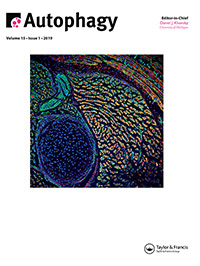- EN - English
- CN - 中文
Using Arabidopsis Mesophyll Protoplasts to Study Unfolded Protein Response Signaling
利用拟南芥叶肉细胞原生质体研究未折叠蛋白响应信号
发布: 2018年12月05日第8卷第23期 DOI: 10.21769/BioProtoc.3101 浏览次数: 6422
评审: Amey RedkarHua LiuPengxiang Fan

相关实验方案

通过简并PCR鉴定二倍体马铃薯Solanum okadae中的S位点F-box蛋白序列
Amar Hundare [...] Timothy P. Robbins
2025年06月05日 2005 阅读
Abstract
Various environmental stresses or artificial reagents can trigger unfolded protein accumulation in the endoplasmic reticulum (ER) due to the folding capacity of the ER being exceeded. This is termed ER stress, and triggers the unfolded protein response (UPR). Assays for activation of the UPR in plants include Tunicamycin (Tm)- or dithiothreitol (DTT)-mediated root growth inhibition, analysis of splicing of the UPR-responsive transcription factor bZIP60 (basic Leucine Zipper Domain 60), and upregulation of relevant UPR genes. We provide here a quick and robust method to detect UPR signaling in Arabidopsis thaliana protoplasts. This assay can also be applied to other plant species for which protoplasts can be isolated.
Keywords: Arabidopsis (拟南芥)Background
Substantial progress has been made over the last two decades in our understanding of the UPR in plants. In addition to its important role in stress responses (Howell, 2013; Bao et al., 2017; Bao and Howell, 2017), the UPR also participates in plant reproductive development, vegetative growth and root development (Deng et al., 2013; Deng et al., 2016; Kim et al., 2018). There are two arms to the UPR in plants that employ three transcription factors: bZIP60, which is activated by IRE1 (Inositol Requiring 1) -mediated splicing of its mRNA (Deng et al., 2011), and bZIP17 and bZIP28, which are activated by S1P- and S2P-mediated cleavage of their membrane-localized proteins (Liu et al., 2007; Srivastava et al., 2013). All three transcription factors induce expression of downstream genes, including molecular chaperones such as BIP3 that assist in protein folding.
Protoplasts can be easily isolated from various plant species, allowing transient expression in protoplasts of potential factors involved in UPR signaling, in place of the time-consuming generation of transgenic plants. In our recent paper on ER stress-regulated autophagy mediated by IRE1b, we successfully detected bZIP60 splicing and BIP3 expression in Arabidopsis protoplasts (Bao et al., 2018) as hallmarks of the UPR (Iwata and Koizumi, 2005; Iwata et al., 2008; Deng et al., 2011), and used this assay to determine the effect of expression of IRE1b mutants. Here, we describe this assay in detail; we believe the robustness and reproducibility of this assay will facilitate plant UPR research.
Materials and Reagents
- Aluminum Foil (Reynolds Kitchens, REYNOLDS WRAP, catalog number: 353224)
- 6-well Plate (Corning, Falcon, catalog number: 353224)
- 12-well Plate (Corning, Falcon, catalog number: 353225)
- 100 x 15 mm Square Petri Dish (Corning, Falcon, catalog number: 351112)
- 14 ml Polypropylene Round-Bottom Tube (Corning, Falcon, catalog number: 352059)
- Electrical tape (ULINE, Hyper Tough, catalog number: 34366)
- Rosette leaves of wild-type Arabidopsis thaliana (WT, Columbia-0 ecotype)
- ire1a ire1b mutant Arabidopsis plants
- IRE1b plasmids
- bZIP60s, BIP3 and Actin2 specific primers
Primers for detecting bZIP60s (spliced form of bZIP60: bZIP60F4 and bZIP60SB2), BIP3 and Actin2:
bZIP60F4: GAAGGAGACGATGATGCTGTGGCT
bZIPSB2: AGCAGGGAACCCAACAGCAGACT
BIP3F: TTCGACCCGAAACGTCTGATTGGA
BIP3R: GCTTGCCTCTGCGCATCATTGAAA
Actin2F: GGAAGGATCTGTACGGTAAC
Actin2R: GGACCTGCCTCATCATACT - Maxiprep Kit (Gene Elute HP Plasmid) (Sigma-Aldrich, catalog number: NA310-1KT)
- RNA Extraction Kit (DNeasy Plant Mini Kit) (QIAGEN, catalog number: 69104)
- cDNA kit (iScriptTM cDNA Synthesis Kit) (Bio-Rad, catalog number: 1708890)
- Tunicamycin (Tm) (Sigma-Aldrich, catalog number: T7765)
- Dithiothreitol (DTT) (Sigma-Aldrich, catalog number: 3483-12-3)
- PEG4000 (PEG) (Sigma-Aldrich, catalog number: 25322-68-3)
- Cellulose R-10 (Yakult, CELLULASE “ONOZUKAR-10”)
- Macerozyme R-10 (Yakult, MACEROZYME R-10)
- BSA (Sigma-Aldrich, Bovine Serum Albumin, catalog number: 9048-46-8)
- DMSO (Sigma-Aldrich, dimethyl sulfoxide, catalog number: 67-68-5)
- Mannitol (Sigma-Aldrich, catalog number: 69-65-8)
- β-mercaptoethanol (Sigma-Aldrich, catalog number: 60-24-2)
- MgCl2 (Sigma-Aldrich, Magnesium chloride, catalog number: 7791-18-6)
- MES (Sigma-Aldrich, catalog number: 4432-31-9)
- NaCl (Sigma-Aldrich, Sodium chloride, catalog number: 7647-14-5)
- CaCl2 (Sigma-Aldrich, Calcium chloride, catalog number: 10043-52-4)
- KCl (Sigma-Aldrich, Potassium chloride, catalog number: 7447-40-7)
- KOH (Sigma-Aldrich, Potassium hydroxide, catalog number: 1310-58-3)
- 2x YT media (see Recipes)
- Yeast Extract (BD Biosciences, BD Bacto, catalog number: 212750)
- Tryptone (Neogen Food Safety, Acumedia, catalog number: 7351A)
- Enzyme solution (see Recipes)
- MMg buffer (see Recipes)
- 40% PEG (see Recipes)
- W5 solution (see Recipes)
- Stock solutions (see Recipes)
Equipment
- Pipette (Eppendorf, Eppendorf Research Plus, catalog number: 2231000222)
- Incubator (New Bruswick Scientific, Innova42, catalog number: M1335-0000)
- Hemocytometer (Hausserscientific, Bright-Line Counting Chambers, catalog number: 3100)
- Microscope (Nikon, Eclipse TS100)
- High Speed Centrifuge (Thermo Scientific, model: SorvallTM RC 6 Plus, catalog number: 36-101-0816)
- Low Speed Centrifuge (Thermo Scientific, model: HereusTM MultifugeTM X3R, catalog number: 75004516)
- Microcentrifuge (Thermo Scientific, model: SorvallTM LegendTM Micro 17, catalog number: 75002403)
- NanoDrop Spectrophotometer (Scientific Industries, model: Vortex-Genie 2, catalog number: SI-0236)
- Thermocycler (S1000 Thermal Cycler) (Bio-Rad, catalog number: 1852196)
- DNA Gel electrophoresis cell (Bio-Rad, Sub Cell GT Cell, catalog number: 1640302, or similar)
- DNA Gel scanner (FOTODYNE, FOTO/Analyst ImageTech, catalog number: 6-9030S2DL, or similar)
Software
- ImageJ
- Adobe Photoshop
Procedure
文章信息
版权信息
© 2018 The Authors; exclusive licensee Bio-protocol LLC.
如何引用
Bao, Y. and Bassham, D. C. (2018). Using Arabidopsis Mesophyll Protoplasts to Study Unfolded Protein Response Signaling. Bio-protocol 8(23): e3101. DOI: 10.21769/BioProtoc.3101.
分类
植物科学 > 植物分子生物学 > 蛋白质
植物科学 > 植物细胞生物学 > 细胞分离
细胞生物学 > 细胞信号传导 > 胁迫反应
您对这篇实验方法有问题吗?
在此处发布您的问题,我们将邀请本文作者来回答。同时,我们会将您的问题发布到Bio-protocol Exchange,以便寻求社区成员的帮助。
Share
Bluesky
X
Copy link











